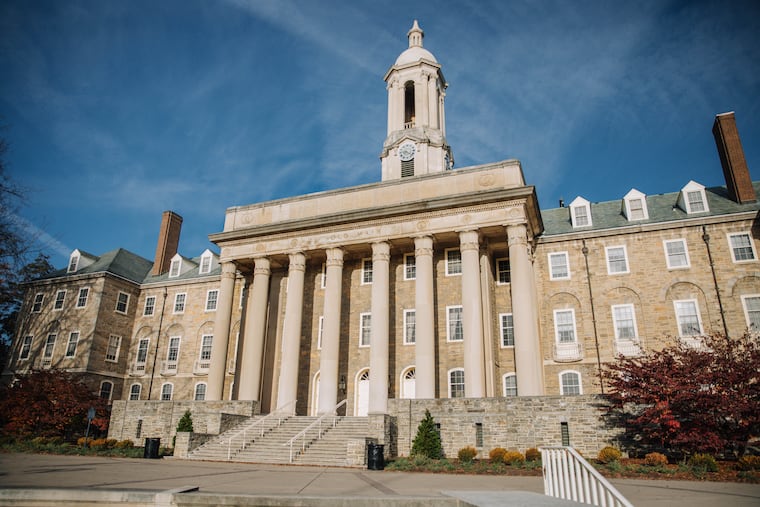Penn State professors and students are raising concerns about a proposal to merge its two law schools
“We recognize that there is a cost to having law schools in two locations, but given the development of Penn State’s two law schools, it has been proven that both have added value,” professors wrote.

Concern is mounting about Pennsylvania State University’s plan to join its two law schools in Carlisle and University Park.
Under the plan, Penn State President Neeli Bendapudi has said, Penn State Dickinson Law in Carlisle would remain as the primary site, led by its current dean, Danielle M. Conway.
That has led to anxiety among faculty and students at Penn State Law at University Park, who wonder what would happen to their school, which is approximately 80 miles from Dickinson Law. More than 40 of the 51 full-time faculty at Penn State Law issued a statement earlier this month, warning of a significant loss if a unified law school did not maintain a strong presence in University Park.
“We recognize that there is a cost to having law schools in two locations, but given the development of Penn State’s two law schools, it has been proven that both have added value and have provided benefits to Penn State and their respective communities,” the professors wrote.
People have questioned why Carlisle would be the hub when Penn State Law enrolls more students and employs more faculty. Penn State said a 2016 agreement between Penn State and the Dickinson Law Association requires the university maintain a law school in Carlisle unless a court approves its discontinuation. Faculty have said they heard that Dickinson’s status as the oldest law school in Pennsylvania and its proximity to the state Capitol in Harrisburg may be factors as well.
» READ MORE: Penn State may reunite its two law schools in Carlisle and University Park
But Penn State Law, given its prominent location on the flagship university’s main campus, has been able to attract high-level faculty and students who want that kind of setting, faculty say.
Read the letter
Students also worry what it would mean to their degrees if Penn State Law lost its identity.
“Our degrees will come from a school that doesn’t exist,” said student Lewis Parsons, 34, of Gloucester, Mass. “A failed institution. This will certainly impact us for our entire professional lives.”
Bendapudi has established a panel to recommend how best a merge would occur, with a report due in six months. The plan would be subject to approval by Penn State’s board of trustees and the American Bar Association. She has estimated that once approved, it would take 18 months to two years for the change to take effect.
Penn State said in a statement Monday that the panel will include a balance of representatives from both law schools that will “explore options and will take into account the strengths of both schools, which are many.”
Bendapudi said last month when she announced the plan that it had become “increasingly evident that the two-law school model where we have two units competing with one another under the Penn State umbrella is not the best approach” and that “concentrating our resources would allow us to build a much stronger law school.”
After acquiring the Dickinson school in 1997, Penn State opened a second campus of Dickinson Law at University Park in 2006, with the two operating under one umbrella. Then in 2015, the university established two separate law schools.
Penn State Dickinson Law, which enrolls 282 full-time students and has annual tuition of $53,558, placed 58th among best law schools in the most recent U.S. News rankings. Meanwhile, Penn State Law, the University Park school, with 553 full-time students and annual tuition of $51,648, finished 64th.
The announcement that Penn State would combine its law schools and keep Carlisle as the main hub has led to confusion, said Kit Kinports, a law professor and faculty chair at Penn State Law, with some students and others mistakenly thinking the university already has made a decision to close the University Park law school when that’s not the case.
“The point of the letter was to correct that misimpression and to point out the value of having a presence in University Park,” she said.
And they wanted to make their case clearly so the panel will see it as they begin their work, she said.
In the letter, faculty wrote that Penn State Law has attracted international students to the school in part because of the international student community at University Park, they wrote.
More than 2,500 students have graduated from the school since it opened and have become partners in some of the largest law firms, as well as working in government and nonprofits, the professors wrote.
Students have been able to get dual degrees in areas such as business, education, and international affairs because of the wide range of courses University Park offers, they said.
Kaela Gray, a 2021 Penn State Law graduate from Canada, said she toured the Carlisle campus when she was looking to enroll in law school and decided against it in part because of its smaller size.
“When you say Penn State Law, people know where it is,” she said. “Penn State is a Big Ten school. It has a big reputation.”